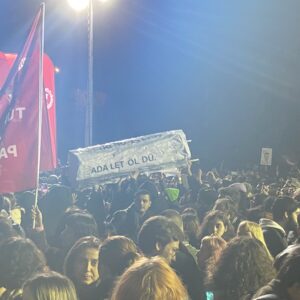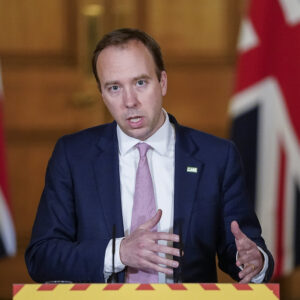Source >> Left East
Note from LeftEast editors: The following interview with Jeremy Corbyn was conducted by Levente Szadai and Csaba Tóth for Mérce on May 7, 2023, in Budapest, and published in Hungarian translation on May 9. We republish the lightly edited transcript as part of a collaboration within ELMO – The Eastern European Left Media Outlet.
When you became Labour leader in 2015, in one of your first speeches you thanked the “ordinary decent people of Hungary” for helping Syrian refugees. Today, eight years later, we are in quite a different world, surrounded by fences and mainstream politicians demanding the stopping of “small boats” on sea. What changed?
The first thing I did when I became leader, literally within an hour, was to go to a demonstration in the square in front of the British Parliament for “Refugees are welcome here.” And I made the point then that many people across Europe were doing everything to welcome refugees, which is what we should do, because they are victims of war and victims of the environment and victims of human rights abuse. Now what’s changed is that some people have carried on that great tradition, but populist politicians have decided that refugees are threatening our jobs, threatening our living standards. And in the case of Britain, they’re even claiming they’re threatening our health. It is horrible and abusive and ultimately very, very dangerous because if you create a sort of hatred towards refugees, then what are you saying about your own society? But I think we should put this in the context of Europe and the rest of the world. Now, tens of thousands of people have died crossing the Mediterranean. Many died trying to get into Greece from Turkey and a considerable number have died in the English Channel as well.
You or I would not willingly get into one of those boats unless we were totally desperate. And some sadly have died as a result of it. They are victims of war. But then, as I was saying in the speech this morning, there are 70 million refugees around the world. The vast majority are not in Europe, they’re not in any European country. They’re in Bangladesh, they’re in Uganda, they’re in Mexico, they’re in lots of countries all around the world. And Europe seems to think that by putting up naval defences, razor wire and surveillance you can keep refugees out. You’ve got to think it through. Why are there refugees? Why have they come from Afghanistan? Why have they come from Syria? Why have they come from Iraq? I think we all know the answer to that. It’s the wars.
How do we fight back against it? By campaigning, by being popular in our campaigning [for] saying that refugees are welcome and look at the contribution they make to our society. We are standing in front of this monument here [ed. n. Budapest’s Martyrs’ Memorial dedicated to resistance fighters, deserters, and the persecuted who were murdered on the bank of the Danube in the winter of 1944–45]. These were freedom fighters who gave their lives to free this country from the Nazis in 1944–45, only six months before the end of the war. They did it because they didn’t think there was anything else they could do to defeat them. Those people that who escaped Nazi Germany, and some did, went through the most terrible hardships. And they’re treated quite rightly as heroes, and their stories are understood. Are we going to wait till the next century before the stories of people crossing the Mediterranean in order to feed their families get written? So let’s get a sense of proportion about this, and what causes this. The majority of refugees are not in Europe, they’re elsewhere.
You’ve already mentioned war. We have a war going on in neighboring Ukraine, quite a great war. It is often argued that if we do not support Western intervention there, we are supporting Vladimir Putin and his war effort. What is your opinion on this issue?
Well, my views on Vladimir Putin and his government in Russia go back to the time he became the Prime Minister and President in Russia. When Tony Blair was entertaining Vladimir Putin at the Opera in London. There were two members of Parliament at a demonstration in support of the Chechen people, Tony Benn and me. And so I’m quite clear about human rights abuses by Putin’s government. And indeed I went on a delegation to Russia during the Yeltsin period when Putin was his deputy to speak up about the war in Chechnya and other issues.
Russia is wrong to be invading Ukraine. No question about that, it’s wrong. The war is getting worse and worse. Tens of thousands dead on both sides. Probably more Ukrainians than Russians, but the issue is how many more are going to die? And so my support is for Lula, the Pope, the Chinese president, and the general secretary of the UN, who are trying to get a peace process going on, because there has to be a cease fire, followed by serious negotiations about what the relationship is going to be like between Russia and Ukraine. If the war goes on, it’s going to get worse, and nuclear weapons are available for both sides. And to me, this prospect is terrifying; therefore there has to be a peace process.
What do you think is the right way to show solidarity with Ukraine then?
To give them the support and the right of asylum, which they have all over Europe and I fully support that. There are many Ukrainians living in my own constituency. I absolutely welcome them, work with them, and they’ve been very well treated and welcomed by the local community. Also it’s to support the Russian peace campaigners who’ve been imprisoned by the Putin government because they’ve spoken up against the war. And to question the pressures for this war from the arms manufacturers, both in Europe and the United States, but also the arms manufacturers in Russia and China and those that are supplying them as well. Through our Peace and Justice project, we’re producing a book on the reality of the arms trade. There’s got to be an alternative. Otherwise, what are we going to be? Spectators in real time, on the loss of tens of thousands more lives.
You mentioned the Pope or Lula, but interestingly, Viktor Orbán is also calling for peace talks, attracting a lot of domestic and international criticism. CPAC Hungary has just taken place, where both Tucker Carlson and Donald Trump have welcomed Orbán on video, so he couldn’t be further away from you politically. Why does Orbán share the same opinion on this then, what do you think?
I certainly can’t speak on behalf of Viktor Orbán. I am very critical of Orbán for his policies towards independent media, his policies towards education, and his policies towards refugees and others. I would think it is probably related to energy supplies that come from Russia into Hungary and it is also probably a desire to make himself an important figure all across Europe. I meet Hungarian politicians in the Council of Europe and other places. Some are fine. Others have appalling attitudes towards minorities and towards asylum seekers, which I find very hard to deal with. I proudly represent a community, where people come from all over the world. 70 different languages are spoken, I’m proud of that. You know what? People can live together, and do.
Capitalism is in a deepening crisis, catalyzed by the Covid-crisis and the war in Ukraine. Many governments are responding to the crisis with economic nationalism, which could have further serious consequences, beyond the fact that it lacks any rationality in terms of global distribution. Living standards are falling everywhere and inflation is rising. Yet the left seems impotent in this situation. Can reformist ideas still be considered appealing in the midst of such a crisis?
We have to make demands for decent living standards and wages. You are quite right about global capitalism. So what we have is global capital organized on energy supplies, global capital organized on food production and distribution, global capital organized on services, and global capital organized on how we communicate with each other through phones for example. So why aren’t we organized on an international basis? Why aren’t we so equally globally organized?
It’s about education, about inspiring people. As I said earlier today in my speech at the conference organized by left and progressive forces in Budapest, let’s bring those workers into the trade unions, who are so grievously exploited by global capital through Ubereats, Deliveroo, and other courier services for example. It’s the strength of working class organizations that will challenge global capital. That has to be the base of how we go forward.
And there are some signs of progress elsewhere in the world. The election of Lula and Petro in Brazil and Colombia is an important step forward. I listened to both of them after they got elected. I was present for both elections. They said that the first thing is to eliminate poverty in their own society. Then to develop an environmentally sustainable society, and an economy that’s based on need not greed. Simple concepts that we have to put forward because free market capitalism, any kind of capitalism, is based on making somebody richer at the expense of somebody else.
And our media adulates celebrities, and says somebody’s really successful, because they’ve got 10 houses, 50 cars, and they’ve got gold watches. Well, and they’ve “done really well.” Well, I look at somebody who’s done really well: a nurse who works in a hospital, a doctor who is curing people, an engineer who’s developing a better transport system. I look at the skills of people, not the personal wealth.
We can see that the working classes do react to the crisis of capitalism. There are militant strikes throughout Europe: in Germany, in the UK, in France. Mass movements in Peru, Sri Lanka, Iran, and so on.
But more political strikes this time than I’ve ever known before. Before I became a member of parliament, I was a union organizer. And we had strikes against cuts in the budget of the public sector, and in support of wage increases. But if somebody from another (for example housing or migrant rights) campaign came along to one of our demonstrations and said, I’d like to speak, it would be quite difficult to persuade the local workers that it was a good idea. It’s completely changed. I was at a demonstration in front of one of our big stations in London, Kings Cross. Lots of people were there, and every other campaign was welcomed.
Still it seems that the traditional organizations of the working class, the political parties, the trade unions, are lagging behind the consciousness and anger of the workers in many cases. What do you think are the reasons for this, and what does it mean for the future of the left?
Very good point. Unions, like any other organization, have an official structure. They have a bureaucracy. And any organization with a bureaucracy, will soon find that bureaucracy is also quite interested in itself. And they sometimes are not as effective or as efficient or as democratically accountable as they ought to be. It’s also about democracy within trade unions. There’s been quite an interesting perverse reaction to a legislation introduced by Margaret Thatcher, which said that the General Secretary of the union had to be decided by popular election, thinking that she could get the media to influence how people voted. And for a while it worked. The media would support a right-wing candidate, the right-wing candidate would get elected, you would have a less effective trade union. That was her whole approach. They then introduced later legislation, which said in order to call industrial action, there had to be more than 50% of the members voting. And there had to be more than 50% voting for the industrial action. Those kinds of participation in any union vote were unheard of.
One of our unions, the Communication Workers Union, has for several years developed a brilliant form of communication with its members through social media, through its own TV channel and through one to one contacts. And they achieved a 90% turnout and an 80% support for industrial action. And they’re winning a very big pay rise and they are able to defend their working conditions as a result of it. It can be done. If you’re appealing to a union member saying “look, we’ve reached the end of the road negotiation. We’ve got to take strike action. Otherwise, we lose money, lose our wages and lose our conditions.”
You’re competing with popular newspapers, commercial television, praise of celebrity. So you’ve got to be very good at your communication, to get people’s concentration for long enough to get their support. Some of our unions have done that. Brilliant, well done them. That’s why some of the strikes we’ve had in Britain in the last year have been very successful.
Art (52) Book Review (121) Books (114) Capitalism (65) China (79) Climate Emergency (97) Conservative Government (90) Conservative Party (45) COVID-19 (44) Economics (39) EcoSocialism (55) Elections (82) Europe (44) Fascism (56) Film (49) Film Review (68) France (69) Gaza (59) Imperialism (97) Israel (119) Italy (45) Keir Starmer (52) Labour Party (110) Long Read (42) Marxism (47) Palestine (163) pandemic (78) Protest (149) Russia (334) Solidarity (133) Statement (48) Trade Unionism (134) Ukraine (339) United States of America (130) War (362)
The Anti*Capitalist Resistance Editorial Board may not always agree with all of the content we repost but feel it is important to give left voices a platform and develop a space for comradely debate and disagreement.
Latest Articles
- The boys are not alrightSimon Pearson points out that a Minister for Men cannot rebuild the infrastructures of solidarity that were torn apart by decades of neoliberal consensus.
- Yemen on the brinkNow that Trump has returned to the White House with far greater arrogance than during his first term, the possibility of re-escalating the war in Yemen with direct US involvement has become very real, argues Gilbert Achcar
- Labour austerity – balancing the books on the backs of the poorestDave Kellaway on Labour attacks on disabled people
- Turkey: a mass movement builds against Erdogan’s power grabUraz Aydin answers questions from Antoine Larrache about the mobilization currently building in Turkey after the arrest of the mayor of Istanbul, who is seen as Erdogan’s main rival in the race for the next presidential election.
- Socialist Health Association react to the abolition of NHS EnglandEsther Giles explains why the removal of NHS England is a necessary but not sufficient step to the NHS we need






